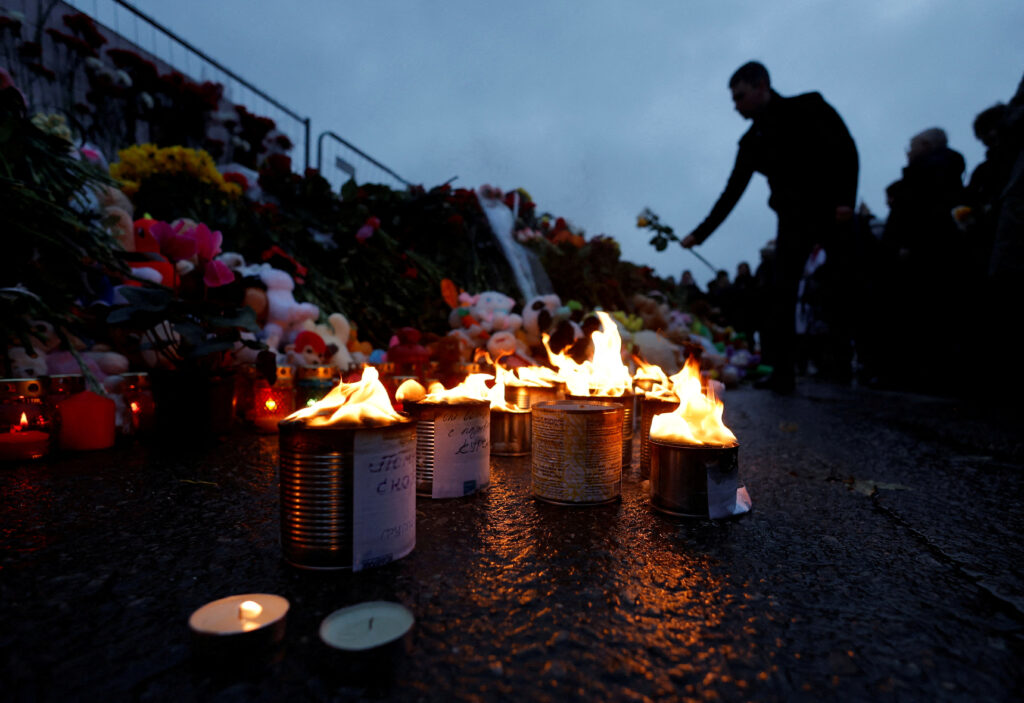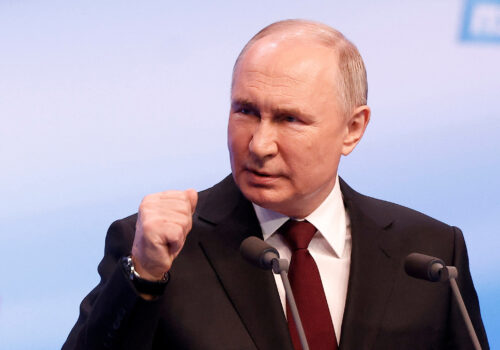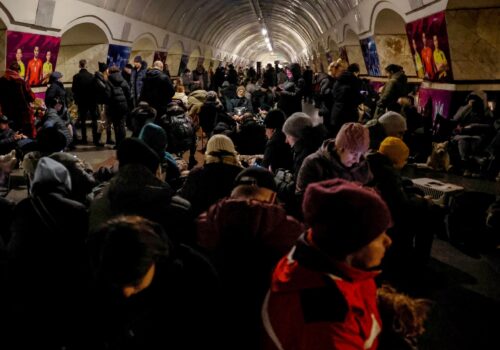The March 22 attack on Moscow’s Crocus City Hall concert venue by the terrorist group known as the Islamic State of Iraq and al-Sham–Khorasan (ISIS-K) has victimized the Russian people—twice. First, at least 139 people were killed and hundreds injured in the spray of gunfire and arson before the start of a sold-out concert by the popular rock group Piknik.
The second victimization, which started just as the fire was being put out, comes in how the Russian people will be denied the truth from Russian President Vladimir Putin’s government. The attack strikes at Putin’s claim to legitimacy as a strongman—so someone else has to be found to blame: Ukraine, which the Ukrainian government, the US government, and others have said was not involved. Even ISIS-K’s quick claim of responsibility was obscured from the Russian people. On Monday, Putin finally acknowledged that “radical Islamists” were responsible—but he still falsely claimed Ukraine was somehow ultimately responsible.
This deception has consequences, most notably in the road not taken by Russia after Friday’s terrorist attack. Consider what a truly responsible Russian government would have done: It would have taken better precautions after the early March warning from US intelligence that an attack was imminent. It appears senior Russian officials, including Putin, downplayed the intelligence warning, perhaps thinking it part of a US plot to disrupt Putin’s reelection. Even if the attack could not have been prevented, a responsible Russian government would now call for international solidarity and joint action against a deadly terrorist group responsible for thousands of deaths in Afghanistan, Pakistan, Iran, Russia, and elsewhere. A responsible Russian government would convene an honest accounting of its security failure to detect the plot and disrupt it.
And, of course, a responsible Russian government would not be embroiled in a destructive war in Ukraine that may have left Moscow distracted, overstretched, and therefore vulnerable. Nor would a responsible Russian government have embarked on the security crackdown (largely unnoticed in the Western media, with some exceptions) against Central Asian workers that fueled grievances that may have allowed ISIS-K to recruit terrorist killers among people already in Russia—though the details at this time remain unclear.
But Putin’s government is not a responsible government, and the Russian people are likely to be denied all these reasonable steps. This means the Russian people will continue to be vulnerable to future ISIS-K attacks, even after the security crackdown that is no doubt coming inside Russia. Nor is there likely to be a change of Russian support for the Taliban in Afghanistan, the Assad regime in Syria, or the regime in Iran—all of which factor into anti-Russian animus among Muslims in Central Asia and the Caucasus that ISIS-K uses for terrorist recruiting.
Russia’s aggression against Ukraine and the return of great power competition to the world stage have not ended the threat of terrorism from ISIS-K and other terrorist groups. The fact that they get less attention in the Western press does not mean those threats have vanished. Terrorism is still a threat that deserves international cooperation, as the Biden administration showed by warning Russia of the threat in early March.
Russia’s intelligence failure that made March 22 possible shows that terrorism’s danger is not past, even while Russia’s irresponsibility makes the world and its own citizens less secure.
Thomas S. Warrick is a senior fellow and director of the Future of DHS Project at the Atlantic Council. He served in the Department of State from 1997-2007 and as deputy assistant secretary for counterterrorism policy at the US Department of Homeland Security from 2008 to 2019.
Further reading
Thu, Mar 14, 2024
All the autocrat’s men: The court politics of Putin’s inner circle
Russia Tomorrow By Mikhail Zygar
A new Atlantic Council report by journalist Mikhail Zygar explores how Russia's war on Ukraine has affected Vladimir Putin's inner circle.
Thu, Mar 21, 2024
Russian victory in Ukraine would leave Europe at Putin’s mercy
UkraineAlert By
A Russian victory in Ukraine would reinvigorate Putin's war machine and leave much of Europe at the mercy of the Kremlin, writes Mykola Bielieskov.
Mon, Mar 25, 2024
The mood in wartime Ukraine: Weariness, resolve, and exasperation
UkraineAlert By
Ukrainians are war-weary but remain resolved to continue the fight despite growing exasperation with the country's most important partner, the United States, write Steven Pifer and John Herbst.
Image: A man lays flowers at a makeshift memorial to the victims of a shooting attack, set up outside the Crocus City Hall concert venue in the Moscow Region, Russia, March 23, 2024. REUTERS/Maxim Shemetov



